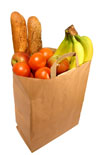Ok, I’m whining. But the obsession with paper vs. plastic shopping bags just plain bugs me.

The thing is, we already know all this. What’s more, we’ve known it for decades.
And (heresy alert!) the truth is that this is that paper-vs-plastic is an astonishingly low-priority issue.
For example, choosing a bag at the checkout line is typically far less important than choosing what to put in those bags. Meat vs. grains, local vs. non-local, and organic vs. conventional all, arguably, have bigger environmental consequences than paper vs. plastic. Likewise, the kind of bag you use probably matters far less than what kind of car (if any) you drove to the store, and how far you had to drive it.
Now, I don’t mean to denigrate all the well-intentioned folks who’ve taken an interest in this issue; or to deny that collective, voluntary action can make a difference in the world.
But In my view, the paper-vs-plastic “debate” fascinates us not so much because it’s genuinely important, but because it reinforces a common frame about sustainability: that it’s all about personal choices. Paper vs. plastic is one of the few “either-or” environmental decisions that we confront daily. And for some reason we conflate making a choice with making an impact.
Obviously, some choices do make an impact—especially the big ones, about your home or your car or your major appliances. Those big decisions really are worth thinking through. But the daily agonizing over paper vs. plastic is pretty small beer—so small that I worry that all the attention to the choice of paper-vs.-plastic simply dissipates our energies, and distracts us from far more important things.
I, for one, wish the whole paper-vs.-plastic “debate” would just go away.









m. leber
No more “free” bags. Cloth or carry. Enough said?
Colin Carmichael
I second the ‘cloth or carry’ vote.I am increasingly dismayed at the ‘green herring’ announcements and media attention. Intense debate on plastic bags, CFLs, and even green-house gas emissions leads to the notion that an interest any ONE of these issues alone is enough. Like recycling in the 90s, media and governments focus on single issues rather than addressing the bigger picture. For example, The other two Rs (reducing & reusing) still struggle to gain any traction. Why? Because for fifteen years, the public has been told that as long as you’re recycling, you’re doing your part for the environment.
Charles S.
Charge for bags and give a discount for cloth bags.
Charlie
Not to beat a dead horse but, yeah, cloth bags that we reuse combined with a charge for using disposable bags is the answer to the question. It’s what they do in Europe and what they have started to do at Ikea and what they need to do all over.Paper vs. Plastic on a day to day level may not be a big deal, but in the aggregate, a ton of us making the choice NOT to use paper or plastic certainly would.I’m afraid that’s the point when people talk about this issue as being unimportant. It is important though I don’t have numbers to illustrate how bad disposable bags are in the aggregate (but I am sure they exist). When this issue is brought up, it should be re-framed so the answer becomes neither.
Arie v.
These debates often lack a frame of reference for making comparisons. I’d prefer a given standard for such debate, such as a cost estimate of bags and their environmental impact (including gumming up recycling machines) for one person over some period of time – say 50 years.Similarly we can look at other costs and benefits such as increased sewage rates for a cleaner sound, gas savings driving economy vehicles, etc. It might add up, but I think I would end up agreeing with Clark, – bags are pretty small beer compared to the lot. If we were successful in banning or charging for them, I’d be more concerned about potential backlash. Calls of “nanny state” might turn a small victory into a larger loss…
Morgan Ahouse
Maybe, consider the great plastic vs paper debate as a gateway to more important debates.Sure, the plastic/paper decision isn’t that important in the physical realm. But in our brains it may carry some importance. The great American philosopher, Evel Knievel, once said something like, “you can’t jump the Grand Canyon in two small leaps; it’s got to be one big leap.” But for social change, it doesn’t work this way. There are many small steps involved. Some will argue over plastic – paper, some are way past it. While others have never thought it might matter. Many are indeed on the green train, and maybe it’s moving too slow. To be sure, though, we’re all in different cars on that train. And hey, ticket sales are up, too.The question for me is how to direct energy from the great plastic-paper debate onto more valuable thoughts, decisions and actions.
margestevens1
I have read thousands of ‘green tips’ and constantly find myself wondering how to prioritize which improvements I can make that would have the greatest impact for the health of the environment. I could use a checklist that says: do these things, in this order of importance. Clark mentions transportation and housing. How am I going to know when I have earned my black belt in environmental responsibility (or would that be a green belt)? By the way, I would also like a checklist like that for my institutions like work and church, and also for my city and county – so I can be a more informed and influential loudmouth – I mean, citizen.